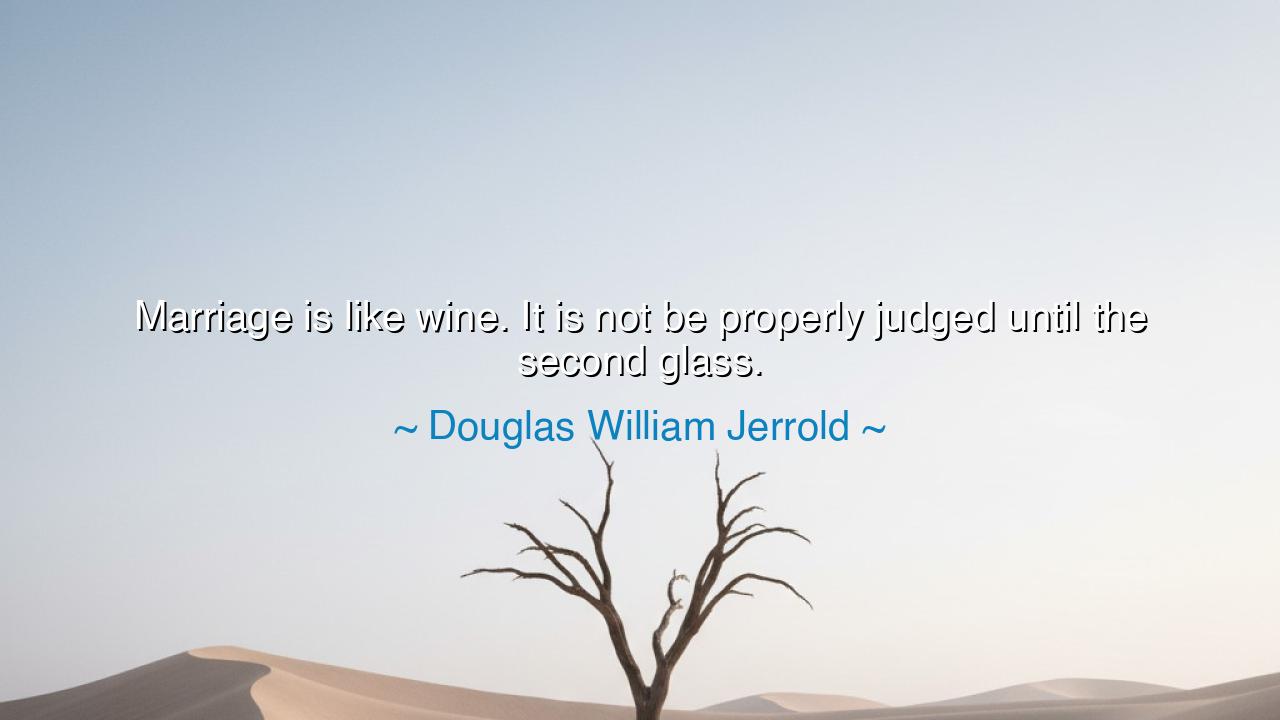
Marriage is like wine. It is not be properly judged until the






Douglas William Jerrold’s saying, “Marriage is like wine. It is not to be properly judged until the second glass,” is more than a jesting metaphor. It is a truth hidden in the folds of humor, spoken by one who understood that time reveals what first impressions cannot. For in the first sip, wine may seem sharp or overwhelming, its character too bold for the tongue. Yet with the second, subtler notes arise—the hidden sweetness, the quiet strength, the lingering depth. So it is with marriage: the surface may mislead, but in the slow unfolding of days, in the endurance of trials, its true spirit is revealed.
The ancients knew this well. They taught that to bind oneself in union is to embark upon a mystery whose fullness cannot be glimpsed at first. The first glass—the early days of love—glitters with passion and novelty, but it also clouds the senses, for desire blinds as much as it delights. Only with the second glass, when the intoxication softens and the heart perceives more clearly, can the true taste of marriage be discerned. Then one begins to see: is the union built upon fleeting sweetness, or upon enduring depth?
Consider the tale of Marcus Aurelius and Faustina, the Roman emperor and his empress. History records that their marriage was not without tension, yet through years of trials, wars, and grief, they remained bound together. The first years may have been marked by the glitter of power and youth, but it was in the long endurance—the “second glass”—that the true measure of their union was tested. Their bond, imperfect as all human bonds are, nevertheless endured, and through endurance revealed its worth. In their lives, Jerrold’s words find flesh: only in the long tasting of time can the character of marriage be rightly judged.
The wine in this metaphor carries further meaning. Just as wine matures with age, so too does love, deepening in richness and losing the harshness of immaturity. The first sip of youth may be fiery, even reckless, but as years pour out like wine from a cask, the flavor becomes rounder, gentler, more profound. Those who judge marriage only by its beginning may be deceived, for the truest beauty is revealed only after time has softened its edges.
Yet Jerrold’s wit also carries a warning. Some wines sour as they age, and some unions too. If neglect, bitterness, or selfishness poison the vessel, the second glass will reveal not sweetness but vinegar. So it is not merely time that makes marriage noble, but the tending of the vineyard: the daily patience, forgiveness, and devotion that preserve the fruit. Without this care, the wine turns, and what once promised joy becomes a bitterness hard to swallow.
From this truth, a lesson emerges for all who listen: do not judge too quickly. In love, as in wine, patience is the truest test. Seek not only the fire of the first sip, but the quiet strength of the second. Ask yourself: will this bond endure beyond passion, beyond novelty, beyond the fleeting glitter of the moment? For only what endures can truly be called love.
Therefore, let the seeker of love take action. Be slow to judge, and slower still to despair. In marriage, cultivate your vineyard with care: water it with kindness, prune it with honesty, shelter it with forgiveness. Taste the second glass, and even the third and fourth, before you measure the worth of your bond. For in endurance, in patience, in the slow savoring of life together, the hidden sweetness of marriage is revealed.
Thus Jerrold’s words, though wrapped in jest, are ancient wisdom dressed in modern speech. Marriage is like wine: it demands time, patience, and tending before its essence is known. Judge it not in haste, but in endurance. For those who drink deeply with faith and care shall find in the second glass not bitterness, but the richness of a joy that only time can bestow.






AAdministratorAdministrator
Welcome, honored guests. Please leave a comment, we will respond soon